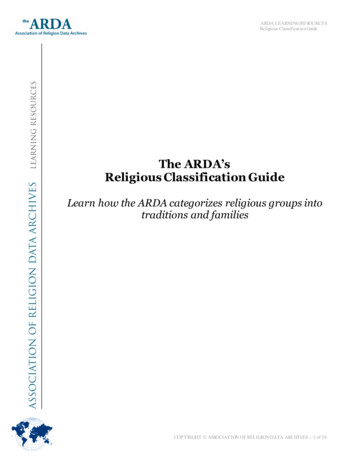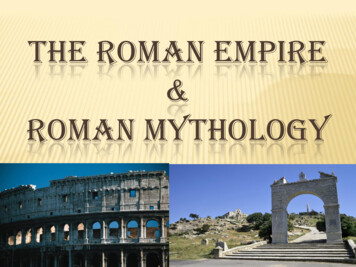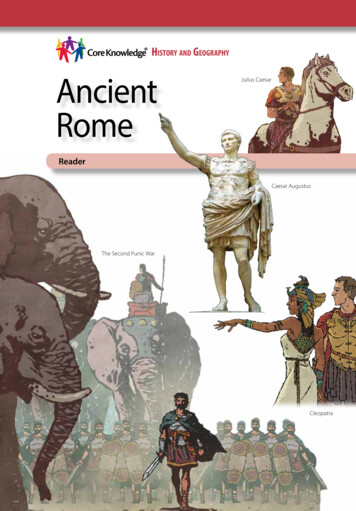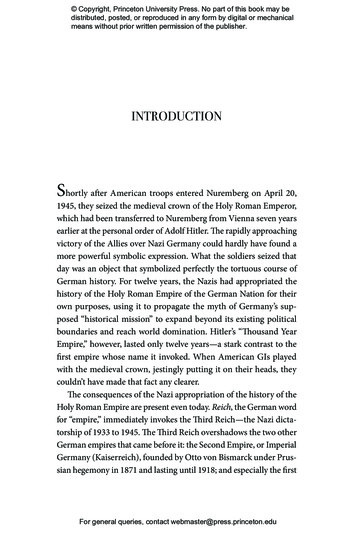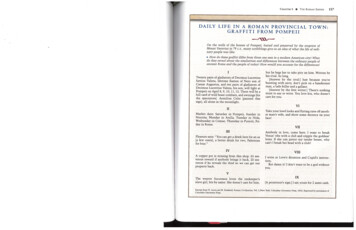
Transcription
ICHAPTER 5I THE ROMAN EMPIRE157DAILY LIFE IN A ROMAN PROVINCIAL TOWN:GRAFFITI FROM POMPEIIOn the walls of the houses of Pompeii, buried and preserved by the eruption ofMount Vesuvius in 79 CE., many scribblings give us an idea of what the life of ordinary people was like. How do these graffiti differ from those one sees in a modern American city? Whatdo they reveal about the similarities and differences between the ordinary people ofancient Rome and the people of today? How would you account for the differences?ITwenty pairs of gladiators of Decimus LucretiusSatrius Valens, lifetime flamen of Nero son ofCaesar Augustus, and ten pairs of gladiators ofDecimus Lucretius Valens, his son, will fight atPompeii on April 8, 9, 10, 11, 12. There will be afull card of wild beast combats, and awnings [forthe spectators]. Aemilius Celer [painted thissign], all alone in the moonlight.IIMarket days: Saturday in Pompeii, Sunday inNuceria, Monday in Atella, Tuesday in Nola,Wednesday in Cumae, Thursday in Puteoli, Friday in Rome.IIIbut he begs her to take pity on him. Written byhis rival. So long.[Answer by the rival:] Just because you’rebursting with envy, don’t pick on a handsomerman, a lady-killer and a gallant.[Answer by the first writer:] There’s nothingmore to say or write. You love Iris, who doesn’tcare for you.VITake your lewd looks and flirting eyes off another man’s wife, and show some decency on yourface!VIIPleasure says: “You can get a drink here for an as[a few cents], a better drink for two, Falernianfor four.”Anybody in love, come here. I want to breakVenus’ ribs with a club and cripple the goddess’loins. If she can pierce my tender breast, whycan’t I break her head with a club?IvVIIIA copper pot is missing from this shop. 65 sesterces reward if anybody brings it back, 20 sesterces if he reveals the thief so we can get ourproperty back.I write at Love’s dictation and Cupid’s instruction;But damn it! I don’t want to be a god withoutyou.VThe weaver Successus loves the innkeeper’sslave girl, Iris by name. She doesn’t care for him,Ix[A prostitute’s sign:] I am yours for 2 asses cash.Excerpt from N. Lewis and M. Reinhold, Roman Civilization, Vol. 2 New York: Columbia University Press, 1955). Reprinted by permission ofColumbia University Press.
158PART1 THE FOUNDATIONS Of WESTERN CIVILIZATION IN THE ANCIENT WORLDROME’S INDEPENDENT WOMEN: TWO VIEWSIn the last years of the republic and into the transition to the empire, Roman writersbegin to describe what might be called the “new woman.” These women arepictured as wearing makeup, dressing and behaving shamelessly, and engaging in adulterous affairs. Perhaps the most shocking of their practices was to engage in sexualactivity, but to refuse to have children. The following passages reveal two differentapproaches to the newly popular means of birth control. The first comes from oranus, a doctor who practiced in Rome late in the first century G.E. The secondcomes from Ovid’s poems about love.According to the doctors, if and when are abortion and contraception appropriate?What reasons do they have for their opinions? What arguments does Ovid makeagainst the use of abortion? How do these ancient arguments compare withmodern ones?SORANUSF or one party [of doctors] banishes abortives, Citing the testimony of Hippocrates who says: “Iwill give to no one an abortive”; moreover, because it is the specific task of medicine to guardand preserve what has been engendered by nature. The other party prescribes abortives, butwith discrimination, that is, they do not prescribe them when a person wishes to destroy theembryo because of adultery or out of consideration for youthful beauty; but only to preventsubsequent danger in parturftion if the uterus issmall and not capable of accommodating thecomplete development, or if the uterus at its orifice has knobbly swellings and fissures, or ifsome similar difficulty is involved. And theysay the same about contraceptives as well, andwe too agree with them.OvIDShe who first began the practice of tearing outher tender progeny deserved to die in her ownwarfare. Can it be that, to be free of the flaw ofstretchmarks, you have to scatter the tragicsands of carnage? Why will you subject yourwomb to the weapons of abortion and give dreadpoisons to the unborn? The tigress lurking inArmenia does no such thing, nor does the lionessdare destroy her young. Yet tender girls doso—though not with impunity; often she whokills what is in her womb dies herself.Soranus, Gynecology 1.19.60 in 0. Temkin, Soranus: Gynecology (Baltimore:1956).Ovid, Amores 2.14.5—9, 27—28, 35—38, trans. by Natalie Kampen in E. fantham,E. P. foley, N. B. Kampen, S. B. Pomeroy and H. A. Shapiro,Women in the Glassical World New York: Oxford University Press 1994),pp. 301—302.LIFE IN IMPERIAL ROME:THE APARTMENT HOUSEThe civilization of the Roman Empire depended onthe vitality of its cities. The typical city had about20,000 inhabitants, and perhaps only three or fourhad a population of more than 75,000. The population of Rome, however, was certainly greater than500,000, perhaps more than a million. People coming to Rome for the first time found it overwhelming and its size, bustle, and noise either thrilled orhorrified them. The rich lived in elegant homescalled domüs. These were single-storied houseswith plenty of space, an open central courtyard,and rooms designed for specific and different purposes, such as dining, sitting, or sleeping, in privacy and relative quiet. Though only a small portionof Rome’s population lived in them, domüs tookup as much as a third of the city’s space. Publicspace for temples, markets, baths, gymnasiums,theaters, forums, and governmental buildings tookup another quarter of Rome’s territory.This left less than half of Rome’s area to housethe mass of its inhabitants, who were squeezedinto multiple dwellings that grew increasingly tall.Most Romans during the imperial period lived inapartment buildings called insulae, or “islands,”that rose to a height of five or six stories and some-
160PART 1 WORLDTHE FOUNDATIONS Of WESTERN CIVILIZATION IN THE ANCIENTJUVENAL ON LIFE IN ROMEearly secThe satirical poet Juvenal lived and worked in Rome in the late first andculturalandalmateritheond centuries C.E. His poems present a vivid picture ofdiscomtheoftellshees,world of the Romans of his time. in the following passagout.forts and dangers of life in the city, both indoors andsibility for What dangers awaited pedestrians in Juvenal’s Rome? Who had responnothing donethe condition of Rome? If the situation was as had as he says, why wasconditions heabout it? Why did people choose to live in Rome at all under thedescribes?Who, in Praeneste’s cool, or the woodedVolsinian uplands,Who, on Tivoli’s heights, or a small town likeGabii, say,Fears the collapse of his house? But Rome issupported on pipestems,Matchsticks; it’s cheaper, so, for the landlord toshore up his ruins,Patch up the old cracked walls, and notify allthe tenantsThey can sleep secure, though the beams are inruins above them.No, the place to live is out there, where no cryof fire!Sounds the alarm of the night, with a neighboryelling for water,Moving his chattels and goods, and the wholethird story is smoking.Look at other things, the various dangers ofnighttime.How high it is to the cornice that breaks, and achunk beats my brains out,Or some slob heaves a jar, broken or cracked,from a window.Bang! It comes down with a crash and provesits weight on the sidewalk.You are a thoughtless fool, unmindful of suddendisaster,If you don’t make your will before you go out tohave dinner.There are as many deaths in the night as thereare open windowsWhere you pass by; if you’re wise, you willpray, in your wretched devotions,People may be content with no more thanemptying slop jars.Indiana University Press, pp. 40, 43. Reprinted byfrom Juvenal, The Satires of Juvenal, trans. by Rolfe Humphries. Copyright 1958permission of Indiana University Press.Society Seen from the harsh perspective ofhuman history, the first two centuries of theRoman Empire deserve their reputation of a “golden age.” One of the dark sides of Roman society, atleast since the third century B.C.E., had been its increasing addiction to the brutal contests involvinggladiators. By the end of the first century C.E., emperors regularly appealed to this barbaric entertainment as a way of winning the acclaim of theirpeople. (See “Seneca Describes GladiatorialShows,” page 164, and “Encountering the Past:Chariot Racing,” page 162.) On broader fronts inRoman society, by the second century C.E., troubles were brewing that foreshadowed the difficulttimes ahead. The literary efforts of the time reveala flight from the present, from reality, and from thepublic realm to the past, to romance, and to privatepursuits. Some of the same aspects may be seen ineveryday life, especially in the decline of vitality inthe local government.In the first century C.E., members of the upperclasses vied with one another for election to municipal office and for the honor of doing service totheir communities. By the second century C.E., theemperors had to intervene to correct abuses inlocal affairs and even to force unwilling membersof the ruling classes to accept public office. Magistrates and council members were held personallyand collectively responsible for the revenues due.Some magistrates even fled to avoid their office, apractice that became widespread in later centuries.These difficulties reflected more basic problems. The prosperity that the end of civil war andthe influx of wealth from the East brought could
164PART1 rON IN THE ANCIENT WORLDTHE FOUNDATIONS Of WESTERN CIVILIZATIOWSSENECA DESCRIBES GLADIATORIAL SHpublic had become adRoman society was never gentle, but by imperial times thets involving gladiacombaformofdicted to brutal public displays of violence in thened criminals, butcondemorwarofrstors. At first, gladiators were enslaved prisonetrained in schoolsallwereTheyts.later, poverty drove free men to enter the combaan unfriendly acgivesSenecabyonby professional trainers. The following selectithem.dwatchecount of the shows and of the spectators whoWhat does he think of the What does Seneca think of the gladiatorial contests?of the spectators towardspectators? Who were the gladiators? What was the attitudewhich they take place?them? What do such entertainments say about the society inDo they have any effect on the character of that society?chanced to stop in at a midday show, expecting fun, wit, and some relaxation, when men’seyes take respite from the slaughter of their fellow men. It was just the reverse. The preceedingcombats were merciful by comparison; now alltrifling is put aside and it is pure murder. Themen have no protective covering. Their entirebodies are exposed to the blows, and no blow isIn the morning men areever struck in vain.thrown to the lions and the bears, at noon theyare thrown to their spectators. The spectatorscall for the slayer to be thrown to those who inturn will slay him, and they detain the victor forI.another butchering. The outcome for the combatants is death; the fight is waged with swordand fire. This goes on while the arena is free.“But one of them was a highway robber, hekilled a man!” Because he killed he deserved to“Kill him!suffer this punishment, grantedmeet thehedoesWhyLash him! Burn him!boldly?killhetdoesn’Whysword so timidly?hismeettohimWhipgame?Why doesn’t he diechestsblow,forblowtradewounds! Let thembare and within reach!” And when the showstops for intermission, “Let’s have men killedmeanwhile! Let’s not have nothing going on!”.ation, Vol. 2,Epistles in Naphtali Lewis and Meyer Reinhold, Roman CivilizFrom “Seneca Describes Gladiatorial Shows” from Seneca, ityp. 230. Copyright 1955 by Columbia Univerknown as the Pharisees, the group that was moststrict in its adherence to Jewish law. He took partin the persecution of the early Christians until hisown conversion outside Damascus about 35 C.E.,after which he changed his name from Saulto Paul.The great problem facing the early Christianswas to resolve their relationship to Judaism. If thenew faith was a version of Judaism, then it mustadhere to the Jewish law and seek converts onlyamong Jews. James, called the brother of Jesus, wasa conservative who held to that view, whereas theHellenist Jews tended to see Christianity as a newand universal religion. To force all converts to follow Jewish law would have been fatal to thegrowth of the new sect. Jewish law’s many technicalities and dietary prohibitions were strange toGentiles, and the necessity of circumcision—afrightening, painful, and dangerous operation foradults—would have been a tremendous deterrentto conversion. Paul supported the position of theHellenists and soon won many converts among theGentiles. After some conflict within the sect, Paulwon out. Consequently, the “apostle to the Gentiles” deserves recognition as a crucial contributorto the success of Christianity.Paul believed that the followers of Jesus shouldbe evangelists (messengers), to spread the gospel,or “good news,” of God’s gracious gift. He taughtthat Jesus would soon return for the Day of Judgment, and that all who would, should believe inhim and accept his way. faith in Jesus as theChrist was necessary, but not sufficient, for salvation, nor could good deeds alone achieve it. Thatfinal blessing of salvation was a gift of God’s gracethat would be granted to all who asked for it.
166PART 1 THE FOUNDATIONS Of WESTERN CIVILIZATION IN THE ANCIENT WORLDCHRISTIANS IN THE ROMAN EMPIREPliny the Younger was governor of the Roman province of Bithynia in Asia Minorabout 112 B.C.E. Confronted by problems caused by Christians, he wrote to the Emperor Trojan to report his policies and to ask for advice. The following exchange between governor and empire provides evidence of the challenge Christianity posed toRome and the Roman response. Questions. What objections did the Roman state have to the Christians? On whatgrounds did Pliny punish them? What procedures did Trojan recommend? Whythose and not others?To THE EMPEROR TRAJANTRAJAN TO PLINYHaving never been present at any trials of theChristians, I am unacquainted with the methodand limits to be observed either in examining orpunishing them,In the meanwhile, the method I have observed towards those who have been denouncedto me as Christians is this: I interrogated theirrwhether they were Christians; if they confessedit, I repeated the question twice again, addingthe threat of capital punishment; if they stillpersevered, I ordered them to be executed. forwhatever the nature of their creed might be, Icould at least feel no doubt that contumacy andinflexible obstinacy deserved chastisement.There were others also possessed with the sameinfatuation, but being citizens of Rome, I directed them to be carried thitherThe method you have pursued, my dear Pliny, insifting the cases of those denounced to you asChristians is extremely proper. It is not possibleto lay down any general rule which can be applied as the fixed standard in all cases of this nature. No search should be made for these people,when they are denounced and found guilty theymust be punished; with the restriction, however,that when the party denies himself to be a Christian, and shall give proof that he is not (that is, byadoring our Gods he shall be pardoned on theground of repentance even though he may haveformerly incurred suspicion). Informations without the accuser’s name subscribed must not beadmitted in evidence against anyone, as it is introducing a very dangerous precedent, and by nomeans agreeable to the spirit of the age.from Pliny the Younger, Letters trans. by W. Melmoth, revised by W. M. Hutchinson. (London: William Heinemann, Ltd; Cambridge, Mass.:Harvard University Press, 1925.suspected. The love feasts were erroneously reported to be scenes of sexual scandal. The alarming doctrine of the actual presence of Jesus’ body in theEucharist was distorted into an accusation of cannibalism.The privacy and secrecy of Christian life andworship ran counter to a traditional Roman dislikeof any private association, especially any of a religious nature. Christians thus earned the reputation of being “haters of humanity.” Claudiusexpelled them from Rome, and Nero tried to makethem scapegoats for the great fire that struck thecity in 64 CE. By the end of the first century,“the name alone”—that is, simple membership inthe Christian community—was a crime.But, for the most part, the Roman governmentdid not take the initiative in attacking Christiansin the first two centuries. When one governorsought instructions for dealing with the Christians, the emperor Trajan urged moderation.Christians were not to be sought out, anonymousaccusations were to be disregarded, and anyone denounced could be acquitted merely by renouncingChrist and sacrificing to the emperor. (See “Christians in the Roman Empire.”) Unfortunately, notrue Christian could meet the conditions, and sothere were martyrdoms.Mobs, not the government, started most persecutions in this period, however. Though theylived quiet, inoffensive lives, some Christians
174PART1 THE FOUNDATIONS OF WESTERN CIvILIzATION IN THE ANCIENT WORLDAMMIANUS MARCELLINUS DESCRIBESTHE PEOPLE CALLED HUNSAmmianus Marcellinus was born about 330 C.E. in Syria, where Greek was the language of his well-to-do family. After a military career, he lived in Rome and wrotean encyclopedic Latin history of the empire, covering the years 96 to 378 Cf. andgiving special emphasis to the difficulties of the fourth century. Here he describesthe Huns, one of the barbarous peoples pressing on the frontiers. Like most Romans,these nomadic peoples appalled him. His account combines observation, hearsay,and prejudice, and it is not always easy to separate facts from fantasy. How did the culture of the thins differ from that of the Romans? How did theirway of life give them an advantage against Rome? How was it disadvantageous?Which of the writer’s statements do you think are factual?The people called Runs, barely mentionedin ancient records, live beyond the sea ofAzof, on the border of the Frozen Ocean, andare a race savage beyond all parallel. At thevery moment of birth the cheeks of their infantchildren are deeply marked by an iron, in orderthat the hair, instead of growing at the properseason on their faces, may be hindered by thescars; accordingly the Runs grow up withoutbeards, and without any beauty. They all haveclosely knit and strong limbs and plump necks;they are of great size, and low legged, so thatyou might fancy them two-legged beasts or thestout figures which are hewn out in a rudemanner with an ax on the posts at the end ofbridges.They are certainly in the shape of men, however uncouth, and are so hardy that they neither require fire nor well-flavored food, but liveon the roots of such herbs as they get in thefields, or on the half-raw flesh of any animal,which they merely warm rapidly by placing itbetween their own thighs and the hacks oftheir horses.They never shelter themselves under roofedhouses, hut avoid them, as people ordinarilyavoid sepulchers as things not fit for commonuse. Nor is there even to he found among them acabin thatched with reeds; hut they wanderabout, roaming over the mountains and thewoods, and accustom themselves to hear frostand hunger and thirst from their very cradles.There is not a person in the whole nationwho cannot remain on his horse day and night.On horseback they buy and sell, they take theirmeat and drink, and there they recline on thenarrow neck of their steed, and yield to sleep sodeep as to indulge in every variety of dream.And when any deliberation is to take place onany weighty matter, they all hold their commoncouncil on horseback. They are not under kinglyauthority, but are contented with the irregulargovernment of their chiefs, and under their leadthey force their way through all obstacles.From Ammianus Marcellinus, Rca Cestac, trans. by C. D. Yonge (London: George Bell and Son, 1862),pp.312—314.centuries. Political chaos and decentralization hadreligious and cultural consequences.Religious Currents in the Empire In some provinces, native languages replaced Latin and Greek,sometimes even for official purposes. The classical tradition that had been the basis of imperiallife became the exclusive possession of a small,educated aristocracy. In religion, the public cultshad grown up in an urban environment and werelargely political in character. As the importance ofthe cities diminished, so did the significance oftheir gods. People might still take comfort in theworship of the friendly, intimate deities of family,field, hearth, storehouse, and craft, but these godswere too petty to serve their needs in a confusedand frightening world. The only universal worshipwas of the emperor, but he was far off, and obeisance to his cult was more a political than a religious act.I
with plenty of space, an open central courtyard, and rooms designed for specific and different pur poses, such as dining, sitting, or sleeping, in priva cy and relative quiet. Though only a small portion of Rome’s population lived in them, domüs took up asmuch a third of the city’s spa



